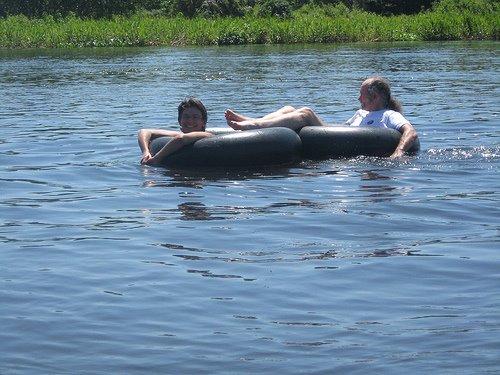I went to visit a jail in Cochabamba with two volunteers from my office, who are teaching a computer class there.
In Bolivian prisons, you have to pay for a bed and a place to sleep. If you have money, you can have a nice room with a TV and telephone. Wealthy drug dealers run their business operations from within prison. If you are poor, you have to fend for yourself and find a place to sleep, maybe on the bathroom floor.
Family members can live inside the prison, or live outside but come inside for contact visits. Many spouses and children of prisoners live inside the prison. There is a project here that offers outside activities for children who live in prison, so that they have an opportunity to go outside sometimes.
We arrived at the jail and went through security, which involved providing ID and emptying our pockets. There was no metal detector, but a female soldier gave me a pat down check. The jail is run by military police, the only type of police that exist in Bolivia. The two volunteers, both male, were given a visitors stamp on their wrists. I asked for my stamp, but was told that it´s only for men.
While going through security, we could see the prisoners standing on the other side of the iron bar gate. They looked like they were waiting for something, maybe visitors. The prison has no uniforms, and the prisoners were dressed in street clothes.
A soldier opened the padlock on the iron gate, and we walked inside. The computer lab was just a few feet from the gate, and consisted of a narrow closet-like room with five computers, three of which work. A sign said that it costs 3 Bolivianos (about 40 U.S. cents) per hour to use the lab. Several kids were in the lab playing video games. We met the man in charge of the lab, also a prisoner. He told the kids to leave since we would have class.
Three prisoners came in for a class. Two of them practiced typing using a typing program, while one of our volunteers helped one write a letter to his wife. It seemed like the man had never written a letter before, and he struggled to spell words.
Another prisoner, who spelled very well, worked at creating a table showing his weekly schedule. It consisted of visiting time for immediate family, general visiting time, church, information from his attorney (brought through his wife), computer class and rest. The man told me that he pays a private attorney because he thinks that the public defenders are inexperienced.
The kids came back to try to use a computer, but the prisoner in charge of the lab kicked them out again. The man told me that there are 260 prisoners. Of those, only 20 have had a trial. The rest are awaiting trial. Unlike in the U.S., all accused people in Bolivia have a trial rather than accepting a plea bargain. A Bolivian attorney friend was shocked when I told her that very few criminal cases in the U.S. go to trial, as nearly everyone, even innocent people on occasion, accepts a plea bargain in the U.S.
The man told me that 60 children live in the prison, and many wives. I asked him what he thinks of the presence of families within the prison. He said that when families are there, the men are more relaxed. Sometimes there is a strike, and the families must leave the prison. When the families are gone, tensions really rise among the men. When the families are present, the men work together to take care of them. For example, the men have agreed that 9 p.m. is bedtime for children.
I think it is horrible that Bolivian prisons don´t provide even the basic necessities such as beds for prisoners, and it´s heartbreaking to see that children are growing up inside a prison. At the same time, it´s more humane to allow families to stay together, and for children to stay with their parents. I was impressed with how respectful the prisoners were to me, and with how safe I felt within the prison even though the prisoners were not behind any bars or glass as in U.S. prisons. I suppose that Bolivia has to let families of prisoners live inside the prisons, as they have nowhere else to go, and Bolivia has no social welfare system.
Friday, February 15, 2008
Subscribe to:
Post Comments (Atom)

No comments:
Post a Comment